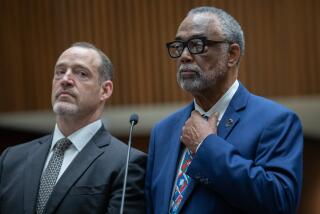Snyder Pleads Guilty in Ethics Case
Former Los Angeles City Councilman Arthur K. Snyder, one of City Hall’s most influential insiders and fund-raisers for three decades, pleaded guilty Thursday to misdemeanor conspiracy and money laundering charges that could carry a jail term, stiff fines and ban him from lobbying for four years.
The negotiated settlement represented a compromise just days before the start of a felony conspiracy trial, one of the more ambitious political cases pressed by the district attorney’s office in recent years. The deal fell short of the more serious and groundbreaking felony conviction that prosecutors had strenuously argued was warranted. Snyder, 63, was accused of illicitly funneling hundreds of thousands of dollars in contributions to candidates through a network of associates and his downtown law firm.
*
The trial was expected to last months and open a window on the inner workings of political fund-raising in Los Angeles and allegedly illegal machinations of a top practitioner seeking to leverage his access and influence with lawmakers.
Sentencing is set for Nov. 22, when Superior Court Judge John Ouderkirk could send Snyder to jail for up to five years, ban him from lobbying and impose fines of up to $200,000.
Although the case was scaled back, government watchdogs and prosecutors hailed the plea agreement. “I think this is one of the most significant [campaign finance] cases in the state of California,” said attorney Robert Stern of the Center for Government Studies, a nonprofit think tank that studies political finance. “It’s one of the few times that a registered lobbyist has been criminally convicted and [a rare] criminal money laundering conviction.”
*
Ravi Mehta, chairman of the state Fair Political Practices Commission, said that “just getting criminal convictions is a very, very strong signal to everyone that this kind of conduct will not be tolerated in the state of California.”
Typically, campaign money laundering cases--in which special interests recruit phony donors to disguise their large contributions--have been penalized only with administrative fines by watchdog agencies such as the FPPC and the Los Angeles City Ethics Commission.
Although not necessarily signaling an end to one of the more colorful and controversial careers in modern local politics, the plea agreement is a major blow for Snyder, who could face additional disciplinary action by the California State Bar Assn.
A wily politico who rose from the streets of Lincoln Heights to the downtown towers of government and economic power--and managed to navigate through a long series of investigations, recall attempts and conflict-of-interest allegations--Snyder had loudly and resolutely declared his innocence in the money laundering case.
*
But Thursday, in a low-key finale to 21-months of pretrial legal maneuvering, Snyder admitted before Ouderkirk that he had conspired to violate the state Political Reform Act, and in eight instances made illegal campaign contributions in the names of others.
Snyder, who left the City Council in 1985 after serving 18 years, could not be reached for comment. His attorney, Mark Geragos, insisted that the plea is a “major coup” because Snyder avoided the possibility of a felony conviction, and still plans to file appeals on a series of underlying legal issues that could overturn the convictions.
Prosecutors said they recommended, and Dist. Atty. Gil Garcetti approved, the multiple misdemeanor deal after a review of the largely circumstantial evidence in the case.
“It’s always a problem to go to trial, especially on someone like Art Snyder. He is a man who is very proficient at what he does,” said Deputy Dist. Atty. Randall Baron. “That makes the case against him very difficult. How he presents himself, the way he does his activities; he [is] not one who is easily snared into criminal activity and that makes a trial against him very difficult.”
As trial approached, Deputy Dist. Atty. Dan Nixon said prosecutors tried to pare the complex evidence down to present to a jury. “In terms of simplifying it, we found the evidence against Snyder was such that a jury could have gone either way,” he said.
“This ensures that he answers for what he has done.”
*
The settlement comes as Garcetti is in the midst of a reelection bid, and it spares several present and former Los Angeles City Council members the potential embarrassment of being called to testify about their dealings with Snyder.
Prosecutors insisted that political considerations played no role in the plea bargain.
For Snyder, the case has been “financially ruinous,” Geragos said. In the past year, Snyder has moved out of his posh Bunker Hill high-rise law offices to smaller quarters near Chinatown.
Geragos said it has also been increasingly difficult for Snyder to obtain government clients or keep up relationships with public officials.
Snyder’s wife--who left the country and has never appeared to answer charges--and five associates were also indicted in the case.
Three of the co-defendants, including Snyder’s former law partner Gil Archuletta, pleaded guilty to conspiracy charges and counts against two others were dismissed. None of those convicted were sentenced to jail, although prosecutors said they will seek an as-yet-undetermined amount of jail time for Snyder.
More to Read
Sign up for Essential California
The most important California stories and recommendations in your inbox every morning.
You may occasionally receive promotional content from the Los Angeles Times.










